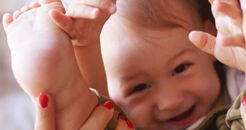 The first 1001 days
The first 1001 days
From infographics by the Parent Infant Foundation
Babies hear at around 24 weeks of pregnancy, recognise familiar voice at birth, and prefer faces to other shapes. We are hardwired for relationships!
In the first years of life, more than 1 million new connections are formed every second in a baby’s growing brain. The way babies’ brains develop is shaped by their interactions with others.
A range of research shows that the way parents interact with their babies predicts children’s later development.
Children’s development in the early years sets them on a positive trajectory, although what happens next also matters. Children’s development at just 22 months has been shown to predict their qualifications at 26 years.
Family income and education is strongly related to children’s development. Babies in higher income families are more likely to have frequent caregiver-child conversations. By age 3, babies with university educated parents have been found to have vocabularies 2-3 times larger than those whose parents had not completed school.
Nobel Laureate James Heckman showed that early childhood is a smart investment. The greater the investment, the greater the return. Rigorous long term studies found a range of returns between £4 and £9 for every pound invested in early intervention for low income families.
When parents experience problems in the first 1001 days it can have long term impacts on their children. One study showed that children whose mothers were stressed in pregnancy were twice as likely to have mental health problems as teenagers.
Adults who reported four or more adverse childhood experiences (ACEs) had 4- to 12-fold increase in alcoholism, drug abuse, depression, and suicide attempts compared to those who experienced none. See a 2023 UK Report here.
Healthy social and emotional development during the first 1001 days:
-
Lays the foundations for lifelong mental and physical health.
-
Means the infant feels safe and secure, ready to play, explore and learn.
-
Leaves him or her ready to enjoy and achieve at school, and progress in the workforce.
-
Enables the child to understand and manage their emotions and behaviours; which means that they can make a positive contribution to their community.
-
Gives them skills to form trusting relationships and to be a nurturing parent themselves; sowing the seeds for the next generation.
Find out further information here.
Retweet about this article:
From infographics by the Parent Infant Foundation, 15/05/2024